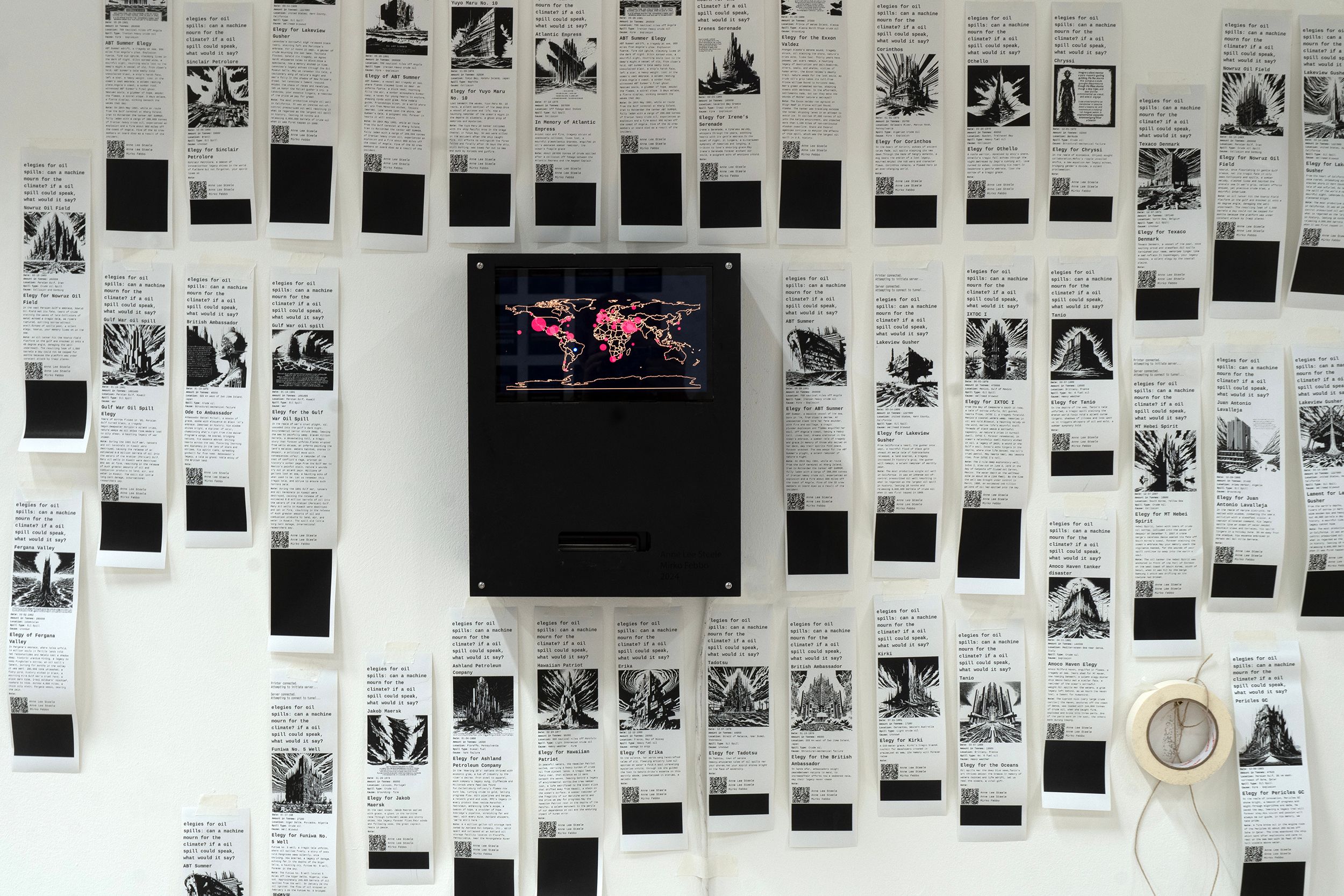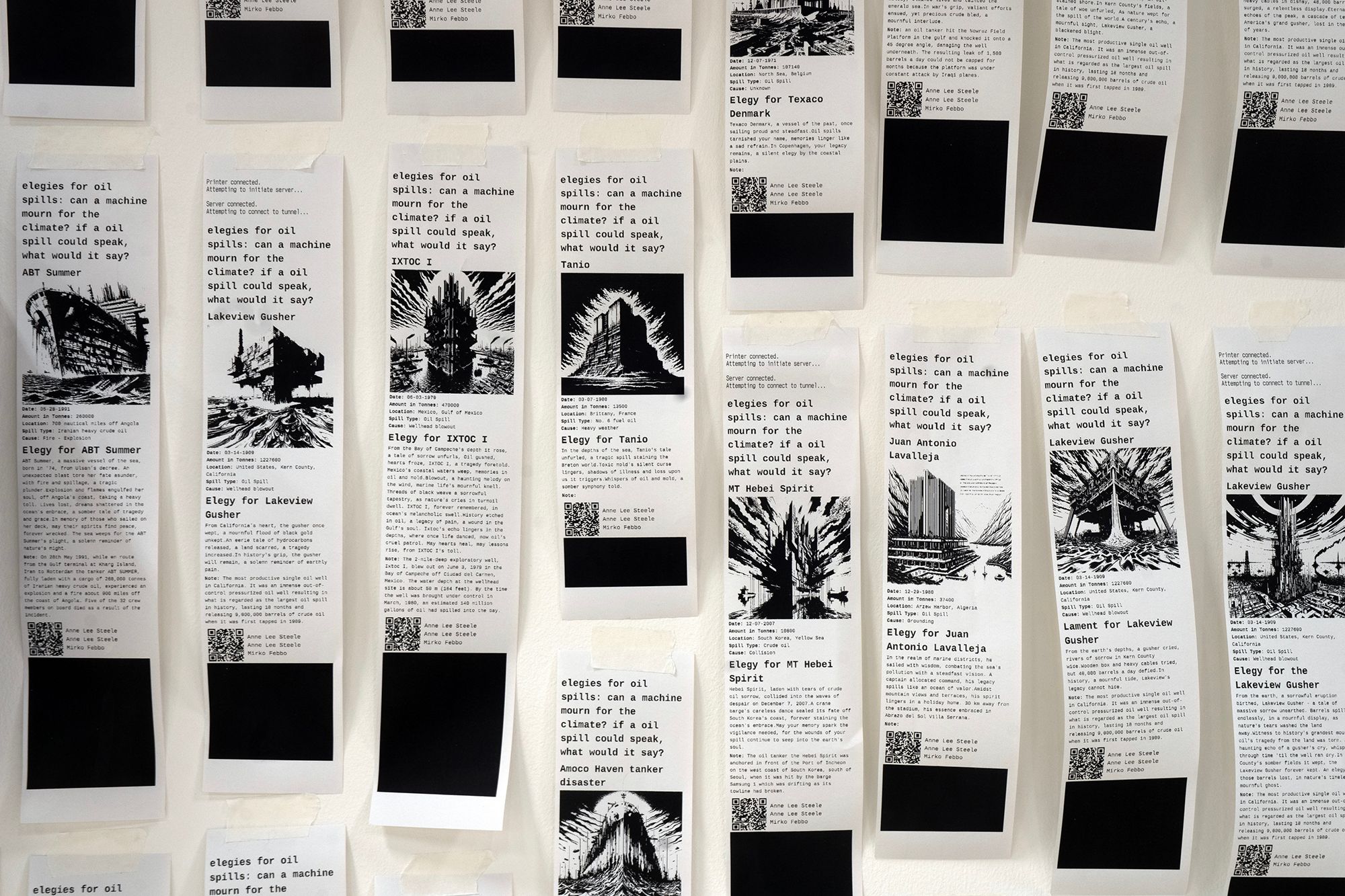elegies for oil spills (and other poetic tactics)
For the past year, Mirko Febbo and I have been collaborating on works that take our interests in extraction industries and supply chains out of classrooms and into the world. The aim was simple: to develop means of translating these topics into more accessible and engaging mediums that go beyond text and data to immersive experiences, ultimately translating this tacit knowledge into tangible formats. 2024 was a year of experimentation, following the principles I had written about at the beginning of the year.
When I became an Artistic Research Fellow at the School of Commons at the Zurich School of the Arts, we have been investigating the meeting point between the abstraction of poetry, the process of datafication, and extractive processes through audio recordings and sensory practices more specifically.
‘Elegies for Oil Spills’ was a part part of the broader series ‘Poetic Tactics to Counter Extraction (and other ways to train attention), hosted at the ‘School of Commons’, based at the Zurich University of the Arts and online. This work is a collaboration between Mirko Febbo, a sculptor turned data visualization and creative computation expert, and Anne Lee Steele, an anthropologist, data journalist, and multimedia artist.
Our most recent project, Elegies for Oil Spills, emerged from the question: “how do we counter the embodied ethos of extraction that underlies both digital and physical life?” - as informed by our training in ethnographic methods and sculpture, respectively.

We first debuted ‘Elegies for oil spills’, in Amsterdam for EASST-4S (an annual conference for Science and Technology studies) this past July, where we were lucky enough to won the ‘Making & Doing’ prize for applied STS work.
Alt: You can learn more in this video interview about the role of creative computation from EASST-4s
Elegies for Oil Spills asked the following three questions.
-
Can a machine mourn for the climate?
-
If an oil spill could speak, what would it say?
-
What can machine mimicry tell us about narratives of oil (and its spillage)?
Using data about world’s largest oil spills, ‘Elegies for Oil Spills’ generates speculative artefacts about environmental disasters – printed on (recycled) thermal paper in the form of a receipt.
The receipt is twice generated by the machine, housed in a literal black box. First, the elegy (a style of poem usually written in the context of death) is generated using AI (specifically, ChatGPT – one of the largest language models in the world) and information about the oil spill scraped from news articles. Using the poem, an image is generated in the Brutalist style that depicts or interprets the input.

It was interesting to bring this piece to different spaces and places, each with different audiences in mind.
Later on in the year, this piece was also invited to participate in the ‘Into the Flux’ exhibition at the International Body of Art in London, UK in October 2024 and the School of Commons Annual Assembly in February 2025. Some focused more on the aesthetics of the installation, while others focused more on conceptual rigor: asking questions about for whom this project was for, not simply how it worked.
This project spawned other collaborations,

We also exhibited the installation ‘trace’ at the Mozilla Festival in Amsterdam in June 2024, an art, tech and society convening, in Amsterdam where participants were able to touch a physical globe, triggering sounds from across the routes of technology supply chains.


In different ways, both of these two projects are a part of a series exploring how poetic tactics can counter resource extraction practices, titled “poetic tactics to counter extraction, and other ways to train attention”.
This installation has previously been exhibited at EASST-4s, International Body of Art, and School of Commons Assembly throughout 2024.